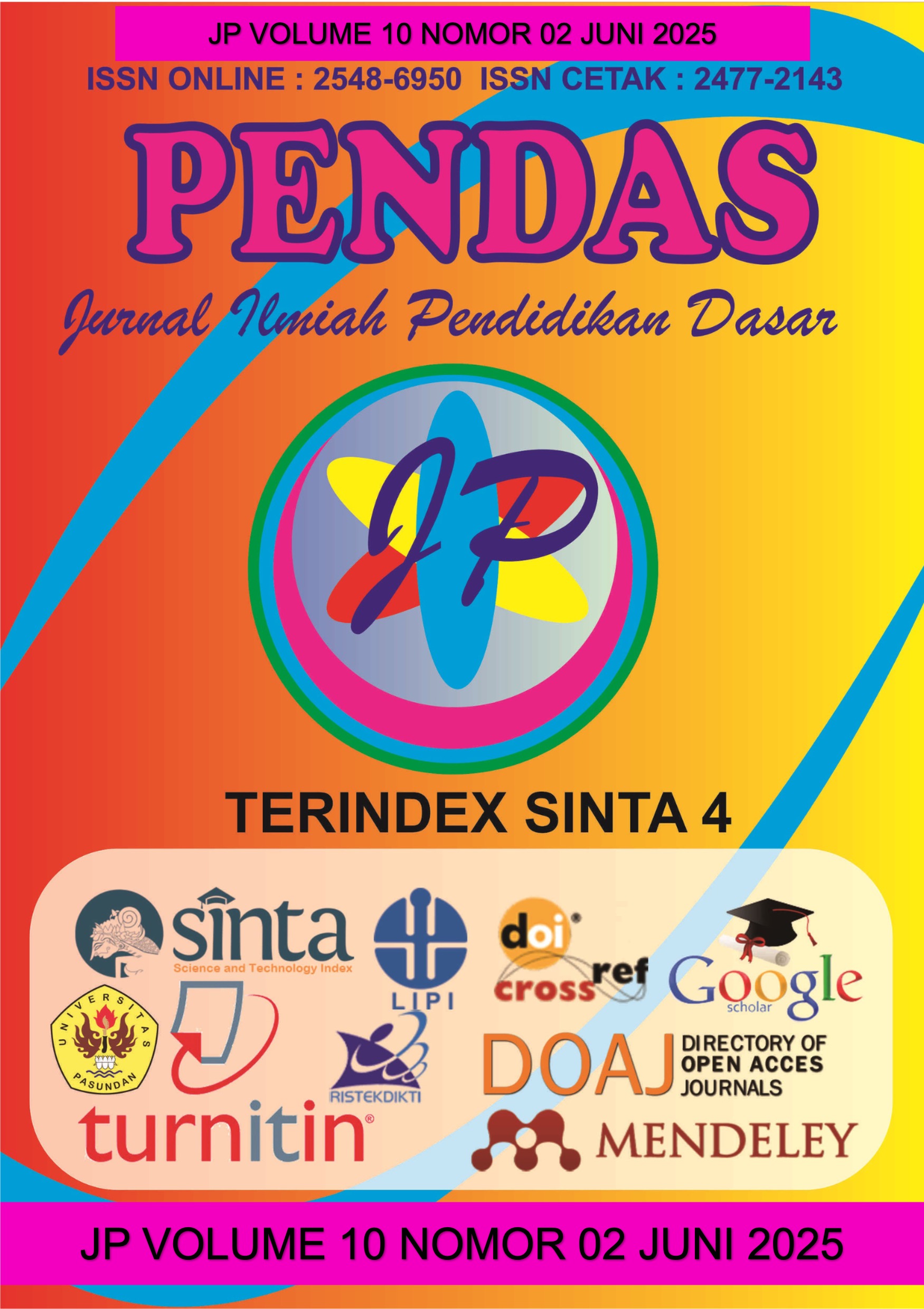ROLE OF EDUCATIONAL HADITHS IN BUILDING ISLAMIC EDUCATIONAL ETHICS IN THE DIGITAL ERA
DOI:
https://doi.org/10.23969/jp.v10i02.26624Keywords:
educational hadiths, Islamic educational ethics, digital era, moral values, digital learningAbstract
The rapid advancement of digital technology has significantly transformed the landscape of education, including Islamic education. While offering opportunities to expand access to knowledge, the digital era also presents ethical challenges such as character degradation, academic dishonesty, and weakened spiritual engagement. This study aims to conduct an in-depth analysis of the role of educational hadiths in shaping and reinforcing Islamic educational ethics in the digital age. Employing a qualitative approach through literature review and thematic analysis, this research explores selected prophetic traditions that emphasize values such as honesty, responsibility, adab (etiquette) in learning, and information verification (tabayyun). Data were collected from classical hadith sources and relevant scholarly publications from the last decade. The findings indicate that educational hadiths remain contextually relevant and can serve as a moral compass for addressing digital-age challenges. The integration of hadith values into digital curricula and learning platforms not only strengthens students’ ethical awareness but also promotes balanced spiritual and intellectual development. The study recommends the development of structured hadith-based learning models and the evaluation of their effectiveness within digital learning environments such as Learning Management Systems (LMS) and Islamic educational applications. Furthermore, collaboration among educators, parents, and policymakers is crucial to ensure the sustainable internalization of prophetic values among Generation Z learners. This research contributes both theoretically and practically to the discourse on Islamic education and digital ethics.
Downloads
References
Adiyono, Ni’am, S., & Akhyak. (2024). Methodology of Islamic Studies: Islam as Religion (A Perspective Epistemology, Paradigm, and Methodology). 24(1), 169–200. http://ejournal.radenintan.ac.id/index.php/analisisDOI:http://doi.org/10.24042/ajsk.v24i1.22636
Agustin, F., Oganda, F. P., Lutfiani, N., & Harahap, E. P. (2021). Manajemen pembelajaran daring menggunakan education smart courses. Technomedia J, 5(1), 40–53.
Alfiah, P., Rahma, A., & Mufidah, V. N. (2025). Implementasi Teknologi Digital Dalam Pengelolaan Kelas Pada Pembelajaran Pendidikan Agama Islam. IHSAN : Jurnal Pendidikan Islam, 3(4), 110–120.
Braun, V., & Clarke, V. (2006). Using thematic analysis in psychology. Qualitative Research in Psychology, 3(2), 77–101.
Cahyono, E., Mafrukhah, H., Sofri, M., & Syahid, N. (2024). Literature Review on The Use of Digital Books as A Media For Learning Religious Science In Youth. Civic Engagement and Social Education Journal, 1(1), 74–86.
Creswell, J. W., & Poth, C. N. (2018). Qualitative Inquiry and Research Design: Choosing Among Five Approaches (4th ed.). Sage.
Diana, A., Azani, M. Z., & M, M. (2024). THE CONCEPT AND CONTEXT OF ISLAMIC EDUCATION LEARNING IN THE DIGITAL ERA: RELEVANCE AND INTEGRATIVE STUDIES. Profetika: Jurnal Studi Islam, 25(01), 33–44. https://doi.org/10.23917/profetika.v25i01.4239
Erlina, E., Koderi, K., & Sufian, M. (2025). Designing A Gender-Responsive Qira’ah Learning Module: Bridging Equality And Inclusivity In Islamic Higher Education. Jurnal Ilmiah Islam Futura, 25(1), 239–262.
Halstead, J. M. (2007). Islamic values: a distinctive framework for moral education? Journal of Moral Education, 36(3), 283–296. https://doi.org/10.1080/03057240701643056
Hasanah, N. A. (2024). OPPORTUNITIES AND CHALLENGES FOR ISLAMIC EDUCATION IN SOCIETY. Islam Transformatif : Journal of Islamic Studies.
Hashmi, U. M., Radzuwan Ab, R., & and Ahmad, M. K. (2021). The representation of Islam within social media: a systematic review. Information, Communication & Society, 24(13), 1962–1981. https://doi.org/10.1080/1369118X.2020.1847165
Hussain, M., & Salim, H. M. (2019). The Role of Islamic Education in Character Building: An Analytical Study. International Journal of Ethics and Systems, 35(4), 534–548. https://doi.org/10.5281/zenodo.5500731
Jannah, M., & S. (2023). Konsep Pendidikan Profetik Dalam Pembelajaran Pendidikan Agama Islam (Studi Pemikiran Kuntowijoyo). IJRC: Indonesian Journal Religious Center, 1(3), 149–159.
Junatama, R. T., & Ramadhan, M. Z. (2025). Peran Guru dalam Mengembangkan Strategi Pembelajaran Adaptif pada Pendidikan Islam di Era Merdeka Belajar. Hidayah: Cendekia Pendidikan Islam Dan Hukum Syariah.
Koderi, Sufian, M., & Erlina. (2023). Developing Lampung Local Wisdom Film of Arabic Communication Skills for Madrasah Tsanawiyah Students. International Journal of Information and Education Technology, 13(12), 2004–2013. https://doi.org/10.18178/ijiet.2023.13.12.2015
Lubis, M., & Ariansyah, F. (2024). The Use of Deep Learning to Improve Teaching and Learning in Islamic Schools. JournalofPergunu and Contemporary Islamic Studies, 1(1), 170–193.
McClellan, B. E. (1999). Moral education in America: Schools and the shaping of character from colonial times to the present. Teachers College Press.
Muhammad Qomari Romadhon, Nurul Qomariyah, M. (2024). The Relevance of Hadith “Falyakul Khairan au Liyasmut” in Contemporary Education: Communication Ethics Strategies for Character Building in the Digital Age. International Journal of Education, Information Technology and Others (IJEIT) 7, 7(December), 343–350.
Mulyani, R. (2023). Hadith and Digital Literacy. International Journal of Islamic Educational Studies, 11(1).
Ningsih, N. W. (2025). Strategi Integratif Pendekatan Psikologis dan Pendidikan Islam dalam Membentuk Karakter Generasi Alpha. QOSIM : Jurnal Pendidikan, Sosial & Humaniora, 626–643.
Nurhasnawati, N., Alwizar, A., Syafaruddin, S., Darmawati, D., MFZ, M. F. Z., HKM, H. W., & ISQ, I. (2020). Systematic review of the literature on islamic religious education design in indonesia: the role of parents in islamic religious education. COUNS-EDU: The International Journal of Counseling and Education, 5(4), 216–223. https://doi.org/10.23916/0020200540840
Primarni, A., Fa, S., & Nuhdi, A. (2025). Integration of Hadith-Based Moral Education in Holistic Education in the 5.0 Era: A SystematicLiteratureReview. Journal of Education and Computer Applications, 2(1).
Romli, M., Sofa, A. R., Magister, P., Agama, P., Islam, U., & Hasan, Z. (2025). Integrasi Al- Qur ’ an dan Al-Hadits Dalam Pengembangan Pendidikan Islam di Madrasah Tsanawiyah Thoiyyib Hasyim Jorongan Leces Probolinggo : Tantangan dan Peluang Dalam Menyongsong Era Digital dan Globalisasi mengetahui bagaimana Madrasah Tsanawiyah Thoiy. Al-Tarbiyah : Jurnal Ilmu Pendidikan Islam.
Searson, M., Hancock, M., Soheil, N., & Shepherd, G. (2015). Digital citizenship within global contexts. Education and Information Technologies, 20(4), 729–741. https://doi.org/10.1007/s10639-015-9426-0
Suwahyu, I. (2024). PERAN INOVASI TEKNOLOGI DALAM TRANSFORMASI PENDIDIKAN ISLAM DI ERA DIGITAL. REFERENSI ISLAMIKA: Jurnal Studi Islam, 2(2), 28–41.
van Dinter, R., Tekinerdogan, B., & Catal, C. (2021). Automation of systematic literature reviews: A systematic literature review. Information and Software Technology, 136, 106589. https://doi.org/https://doi.org/10.1016/j.infsof.2021.106589
Downloads
Published
Issue
Section
License
Copyright (c) 2025 Pendas : Jurnal Ilmiah Pendidikan Dasar

This work is licensed under a Creative Commons Attribution 4.0 International License.














































